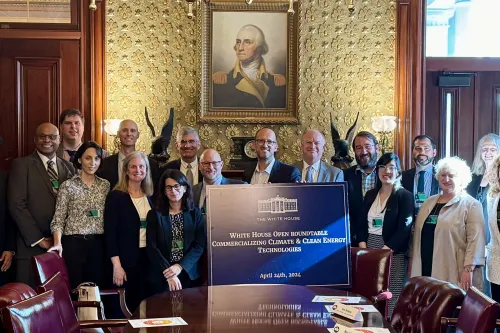COVID-19 Technology Access Framework
Ensuring access to lifesaving technologies during the pandemic
Harvard, MIT, and Stanford commit to COVID-19 technology licensing principles, maximizing access to university innovations
April 7, 2020 – Harvard University, Massachusetts Institute of Technology, and Stanford University have established and committed to a set of technology licensing principles that will incentivize and allow for the most broad and equitable access to university innovations during the global SARS-CoV-2 pandemic.
The joint “COVID-19 Technology Access Framework” sets a model by which critically important technologies that may help prevent, diagnose, or treat COVID-19 infections may be deployed for the greatest public benefit without delay.
In particular, the Framework’s guidelines provide for non-exclusive, royalty-free licensing of intellectual property rights for most types of technologies during the pandemic and for a short period afterward. Licensees commercializing these urgently needed innovations will be expected to distribute the resulting products as widely as possible and at a low cost that allows broad accessibility.
Lesley Millar-Nicholson, Director of the MIT Technology Licensing Office (TLO), shared these comments: "The MIT TLO is committed to supporting the innovation efforts of MIT researchers to provide timely and necessary solutions to the COVID-19 pandemic and beyond. We will utilize the licensing tools we have at our disposal to expeditiously move innovations out of the lab and into the hands of those who can manufacture and deliver them to those who need them. Our focus has always been impact for the good of the world and that is more true today than ever before.
We join with our colleagues at Harvard and Stanford universities in committing to the following framework to guide our COVID-19 related licensing activities in this time of unparalleled need for innovative solutions. We extend our gratitude to be able to serve the MIT community of researchers and we hope that you all stay safe and healthy."
The institutions’ commitments are formally defined by the statement that follows:
COVID-19 Technology Access Framework
We strongly believe that while intellectual property rights can often serve to incentivize the creation of new products, such rights should not become a barrier to addressing widespread, urgent and essential health-related needs. To address the global COVID-19 pandemic, we are each implementing technology transfer strategies to allow for and incentivize rapid utilization of our available technologies that may be useful for preventing, diagnosing and treating COVID-19 infection during the pandemic. To achieve our common goal, we each individually commit to the following guidelines:
- We are committed to implementing COVID-19 patenting and licensing strategies that are consistent with our goal of facilitating rapid global access. For most types of technologies, this includes the use of rapidly executable non-exclusive royalty-free licenses to intellectual property rights that we have the right to license, for the purpose of making and distributing products to prevent, diagnose and treat COVID-19 infection during the pandemic and for a short period thereafter. In return for these royalty-free licenses, we are asking the licensees for a commitment to distribute the resulting products as widely as possible and at a low cost that allows broad accessibility during the term of the license.
- We are committed to making vigorous efforts to achieve alignment among all stakeholders in our intellectual property, including research sponsors, to facilitate broad and rapid access to technologies that have been requested to address the COVID-19 pandemic.
- We are committed to making any technology transfer transactions related to addressing the COVID-19 pandemic our first priority, and to minimizing any associated administrative burdens.
The initial* signatories include:
Harvard University
Massachusetts Institute of Technology
Stanford University
Additional Signatories:
Broad Institute of MIT and Harvard
Cornell University
Dartmouth College
Drexel University
Georgetown University
Memorial Sloan Kettering Cancer Center
Mississippi State University
Northeastern University
Ohio State University
Oregon State University
King Abdullah University of Science and Technology
RTI International
University of Arkansas for Medical Sciences
University of Louisiana, Lafayette
University of Maryland, College Park
University of Nevada, Reno
University of South Alabama
Virginia Commonwealth University
Yale University
Subscribe to our newsletter
Stay updated with the latest insights and events with our quarterly newsletter.


